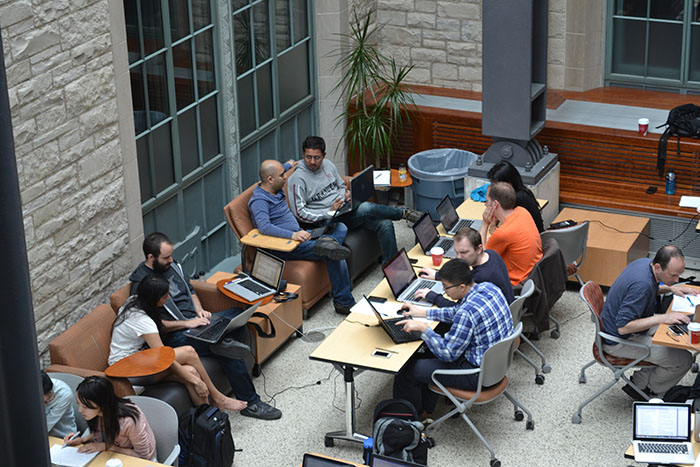Northwestern Analytics Partners with Teradata Aster to Host Hackathon

The Master of Science in Analytics (MSiA) program at Northwestern University teaches students the skills that drive business success in today’s hyper-competitive data-driven world. Students learn to identify patterns and trends; derive optimized recommendations evaluated through simulations; interpret and gain insight from vast quantities of structured and unstructured data; and communicate their findings in practical useful terms that help drive business success. The program is housed within one of the top Industrial Engineering and Management Sciences Department.
On May 13th the Robert R. McCormick School of Engineering and Applied Sciences held the first hackathon. The event was hosted by the Master of Science in Analytics program in collaboration with a leading Bay Area data management and analytics software company, Teradata Aster. “Programs like Northwestern’s Master of Science in Analytics program are addressing a key skill set for business success”, said Randy Lea, Vice President, Teradata Big Data Practice. “Combining math, programming, visualization techniques and business concepts in a program like this is developing the future analytical groups that our customers are building out in their organizations.” Prior to the event the students attended a training session on the Teradata Aster platform, taught by Teradata specialists Russ Ratshin and Ewan Oglethorpe. After the training Peter Schmidt, a current MSiA student, explained “as we explore using open source technologies like hadoop and pig over the map reduce framework in our Big Data course, it is great to obtain experience and exposure to commercial tools like Aster that not only leverage the map reduce framework but also extend it for use with general SQL.”

The hackathon was a day-long competition where students explored the features of Teradata Aster’s system and applied the technology to the provided data sets. By the end of the day, the MSiA student teams presented their findings to a panel of judges and their peers. Students were challenged to think creatively outside of the box about data in a limited amount of time. One of the main goals of the hackathon was to provide hands on experience with a leading platform in the field of big data analytics. Students used various techniques and methodologies of Aster to analyze their data and create visualizations.
The students were split into teams of two and were allowed to choose from eight different publically sourced data sets (NFL, MLB, Amazon reviews, State of the Union addresses, airline flight data and US consumer bank complaints). Students then cleansed the data and began implementing the Teradata Aster-based solutions. Many students supplemented the provided data with external data sources which led to more diverse and intriguing analysis.
The MSiA program includes a course on business communication and storytelling techniques that enhance the students’ awareness of important data interpretation and adoption skills. As a key part of the hackathon experience, students successfully provided unique and creative presentations to demonstrate their findings. One compelling presentation came from Andrew Fox and Anuleka Ellan Saroja who focused on the sentiment of reviews in three designated periods after a product is released on Amazon. Using the product ratings and sentiment analysis of review text, Andrew and Anuleka discovered that the initial reviews do not have a meaningful impact on reviews made later in the product timeline. The two students also found that very few negative reviews are given after a product has been available on Amazon for a long time.

The hackathon culminated with the awards presentation at the end of the night. Teradata also provided a generous gift sponsoring the first two teams to attend their Teradata Partners User Conference in Nashville at the end of October. The judging was very tight as the panel was extremely impressed with the level of effort and creativity from all participants. Ultimately, first prize went to Peter Schmidt and Kyle Hundman for their analytic model predicting Amazon review “helpfulness.” Second prize was awarded to Bridget Hendricks and Alex Milut for their analysis on historical State of the Union Addresses since 1790. One of their most interesting findings was that Bill Clinton used the word “I” more than any other president’s State of the Union Address. The third (Matt Yancey and Dixin Liu) and fourth (Adrian Montero and Macario Lullo) place prizes were provided by the Master of Science in Analytics program.
MSiA Students completed their first hackathon with resounding success. Each student ended the day with a new skill and a strong understanding of Teradata Aster. Director and Professor Diego Klabjan explained “The event was a success because the students were able to find ways to analyze the data creatively by using their prior knowledge and additional external data sources. By using one of the most user friendly, yet extremely sophisticated, platforms , provided by Teradata Aster, they were able to effectively analyze the data in a short time frame.” MSiA is looking forward to hosting such events in the future. “It was exciting to see the creativity of the teams in applying their technical skills to discover new insights in the data sets”, said Lee Paries, Regional Vice President, Teradata Big Data Practice. “With minimal training and no prior hands on experience with Aster, the teams were able to quickly engage and deliver around the iterative discovery analytics process with the Aster platform”. The MSiA program is very thankful of the support from Teradata Aster’s team. Mary Gros, Director Business Relations at Teradata was also instrumental in supporting the event.


